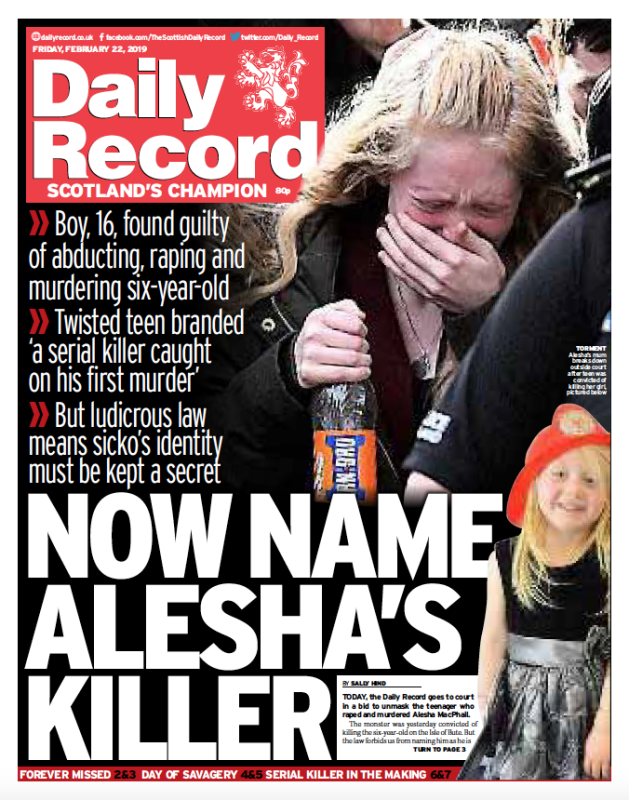
The 16-year-old boy who raped and murdered Alesha MacPhail can be identified as Aaron Campbell after a judge allowed his name to be reported.
The six-year-old girl’s body was found in woods on the Isle of Bute on 2 July last year, hours after she was reported missing from the house her father shared with his parents and partner on the island.
A jury at the High Court in Glasgow took three hours to find the teenager guilty of rape and murder yesterday following a nine-day trial.
The 16-year-old remained anonymous as Section 47 of the Criminal Procedure (Scotland) Act 1995 prohibits the identification of under-18s subject to criminal proceedings.
But following submissions from Tony Graham QC on behalf of several news organisations today, Judge Lord Matthews ruled Campbell (pictured) could be named.
Lord Matthews said: “I can’t think of a case in recent times that has attracted such revulsion.
“I intend to grant the application. The press may name the accused and publish images of him.”
Associated Newspapers, BBC Scotland, Sky, News UK and Ireland, Newsquest, Scottish Daily Record and Sunday Mail, and STV joined together in the bid.
The Daily Record used its splash today to call for Campbell to be named, calling the law “ludicrous”.
The newspaper said: “The teenager involved in this case behaved in the most obscene and depraved manner possible. He knew the extent of what he was doing, how wrong it was and the misery it would cause.
“It is another sign of the justice system’s warped priorities that he continues to be protected in this way.”

Graham told Lord Matthews it would be “naive” to think the teenager’s identity is not already known among members of the Bute community and at Polmont Young Offenders Institute.
He said the name of the boy had been on Facebook, Twitter and available via a Google search since last July.
A “substantial majority” of Scotland’s printed press and broadcast media are represented in the application, the lawyer said.
He asked the judge to allow the publication of the boy’s name, address, school, and images of him.
Prosecutors said they would remain neutral.
Brian McConnachie QC, representing the boy, said: “The fact that things may be on social media is not a reason that the court should overrule the prohibition.”
He added: “It’s little argument to say, well, it’s [his identification] going to happen when he’s 18 anyway.”
McConnachie also said the fact that the boy had incriminated another person was no reason to identify him.
He said: “To make an order on the basis that Toni Louise McLachlan was incriminated would simply be tit for tat and nothing more than that.”
Media law lecturer Frank Shennan told the BBC’s Good Morning Scotland today: “The reason for not naming under-18s is to protect what is seen as vulnerable people.
“And the reason for applying to have the ban lifted is a sense of outrage that somebody should be able to hide behind this protection when they have been found guilty of committing such a shocking crime.
“Ironically until three years ago, we could have named him because the rule applied to under 16s only and it was changed.”
On Thursday, Lord Matthews told Campbell he had committed some of the “wickedest, most evil crimes this court has ever heard”.
The trial heard Alesha was days into her summer holiday on the island with father Robert MacPhail, 26, and grandparents Angela King and Calum MacPhail when she was snatched by Campbell, who tried to blame her father’s girlfriend Toni McLachlan, 18, for the crime.
Campbell’s semen was found on the schoolgirl, and he claimed McLachlan must have planted it there after the pair had sex.
Campbell took Alesha from the bed where she was sleeping and inflicted horrific injuries on her before dumping her body in woodland.
During the trial pathologist John Williams told the court Alesha had 117 separate injuries, and a post-mortem examination he conducted indicated she had died from “significant and forceful pressure to her neck and face”.
He agreed the injuries to her private parts were “catastrophic” – more severe than any he had ever seen before – and were at least partially inflicted while she was still alive.
Picture: Police Scotland/PA Wire
Email pged@pressgazette.co.uk to point out mistakes, provide story tips or send in a letter for publication on our "Letters Page" blog






